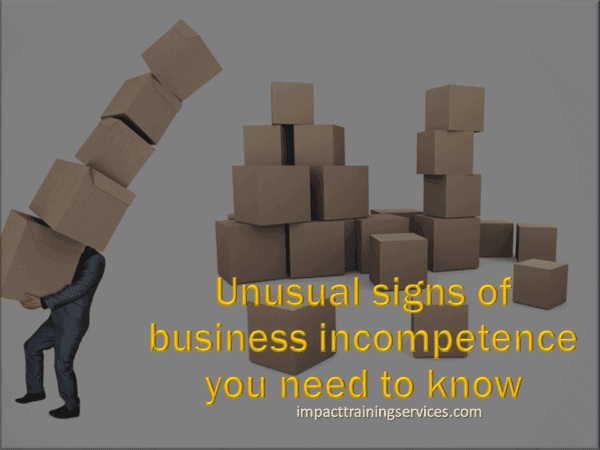6 Unusual Signs of Business Incompetence You Need to Know
- Home
- 6 Unusual Signs of Business Incompetence You Need to Know

Business incompetence is like a global epidemic.
And like any true epidemic, while it is widespread, there are pockets of higher concentration in certain areas.
Unfortunately, one of these areas of high concentration appears to be in small and medium size businesses.
“Not mine!” I can hear you shout. I can even hear you pound your desk and ask no one in particular “What is the big-bad-word matter with this woman?”
But what if I were to go a bit further and tell you that YOU, the owner and leader of the business, might be guilty of incompetence and not even know it?
Now I can hear your silence…
You see, in many instances, you recognize the signs of incompetent management and you avoid it like the proverbial plague.
In others though, you are not even aware that you are the one who is incompetent, and the impact this is having on your business.
To be fair to you, if you don’t know the signs or symptoms of a problem, you can’t begin to fix that problem.
So just for you, from my own empirical evidence, here are 6 unusual signs of business incompetence you need to know.
But why do you even need to know them?
Because very quietly in the background, corporate incompetence is undermining your professionalism and your business success.
It’s impacting your revenue, affecting your business relationships and creating discontent in your team.
Your mission then, should you accept, is to recognize the signs of an incompetent boss, even when that boss is you, and fix the problem fast before it destroys you and your business.
So if you’re ready, here are 6 sneaky signs of incompetence, in no particular order…
1. Not using systems in your business
As business goes, a system is a set of procedures or processes which you use to deliver your products and services to your clients and customers, in a uniform and consistent manner.
Read that definition again!
I am always amazed at the number of small businesses that attempt to do business without systems. And the reasons for not having them are as ridiculous as not having them.
Listen to me carefully, systems do not stifle your creativity neither are they only for big businesses.
As a matter of fact, they prevent incompetence in the workplace and guarantee a smooth, efficient operation.
Businesses and business people without systems are arbitrary in their approach to the delivery of service.
Their approach can depend on how they feel about themselves or the client.
It might be impacted by whether they are broke or not, or even something as unrelated as the state of weather.
Just looks at what happens when you implement even simple systems for the critical areas of our business:
- You can examine your processes and improve them
- They let you quickly integrate new hires into the business
- The quality of your service is consistent and non-performing areas can easily be spotted and fixed
- You can take more time off without feeling guilty
- You have more time to engage in high value activities
- AND…you will reduce or eliminate incompetence
So go ahead, implement systems in the key areas of your business.
They don’t have to be complex but they must allow you to rinse and repeat behaviour and processes, even when you’re not present.
2. Deliberately not keeping your word
It seems as though it is the norm for some of you to promise a customer or team member something like: “I can do that for you in two weeks.”
The problem is, that even as you utter those words, you’re already thinking of the excuse you will make in two weeks, when the job is not finished or promise not kept.
According to you, you do this because “that’s what they prefer to hear.”
Yes, you want to keep the customer happy or make something happen for your business.
But when you know you’re not going to match your actions to your words, you’re being dishonest and deliberately being an incompetent person!
Furthermore, it shows you’re not organised. When you’re organised, you don’t have to make rash promises without clarifying exactly what you’re committing to.
This is not the behaviour of professional and serious business people.
It’s far better for you to check that you can deliver on your word BEFORE you give your word. Your professional reputation demands it.
In addition, if you plan to be in business for any length of time you must learn the value of trust and its connection between repeat customers and word of mouth advertising.
Keeping your word guarantees both.
3. Spreading your workers too thin
I know there are times when you may have to cut costs. It’s an essential component of any business survival.
But did you know it’s also one of the fastest ways to overburden normally competent employees?
And before you know it, you have incompetence throughout your business – incompetent employees led by incompetent managers.
When you assign too many duties to an employee because you don’t want to hire new staff, here is what happens:
The employee now has to shift a very limited amount of time, energy and focus to take on additional and often unrelated tasks.
This results in attempts at multi-tasking – an incompetent and ineffective approach to work – even in the best of times.
Spreading employees too thin can hurt your business in many ways. If you must cut staff then you have to make a big effort to help remaining employees remain competent.
As part of your strategy for cutting staff, be sure to include existing employees in your decision. They may surprise you with the ideas they can come up with.
4. Not consciously choosing your clients leads to incompetence
“Hmmm…How does this lead to incompetence?” you’re asking…
As a service provider, for the most part, when you’re serving your clients, you need to work closely and collaboratively with them. You have to attend many meetings and meet several tight deadlines.
When you say “yes” to any and every person that wants to work with you, because all you can think of is the money you can make, here is what happens.
You soon develop a clientele whose personality and work preferences do not match yours.
When this happens, your enthusiasm for their projects drop. You begin missing deadlines, delivering as agreed becomes difficult and resentment and incompetence set in.
So what can you do about this? Choose you clients.
Develop criteria for your ideal client. When you do, keep in mind things like how you like to communicate, how you like to work and of course, how you like to be paid.
When you are clear about who you want to work with and how you want to work with them, you create trust in your business relationships and closes out any opportunity for incompetence.
I must remind you that even when you’re selective, there will be times when a client will look like a good match and as such, end up in your portfolio.
Don’t be afraid to write an exit programme if the relationship isn’t working out…
5. Preferring weak job candidates/employees
Some of you actually prefer weak job candidates or employees.
That’s hard to believe, isn’t it?
Normally, weak job candidates are the results of a poor selection pool or process or both.
But incompetent manager often (unconsciously) prefer them because they can control them in several ways.
You see, with a weak or “Yes Boss” employee, you can expect your instructions to be carried out without resistance.
Contrast this with a hiring a highly-skilled person and then you still want to do things your way. The conflict will not be easy to manage.
And what you’re actually creating is the type of business and corporate incompetence that’s fueled by ignorance and insecurity.
In other words, You don’t have the knowledge or confidence to hire people smarter than you and get out of their way.
Worst of all, this employee will move on to a smarter business owner or manager and help them to grow their business. And that business just might be in the same market as yours…
6. Constantly working long hours is a sign of incompetence
Perhaps I’m mashing your corns here…
But when I see you working long hours, I’m don’t rush to be impressed.
You see, in my experience, poor managers work very long hours. You behave as though you’re some kind of martyr but to me, it’s one of the signs that you’re just simply incompetent.
When you have to work long hours all the time, you’re usually focusing on small or irrelevant tasks which you feel comfortable doing.
All the while, you try to convince yourself that no one else can do them properly.
To manage and run your business effectively, you must prioritize, you must pace yourself and you must delegate.
In this way, you free yourself to make the big, key decisions that move your business forward —marketing plans, financial forecasts, meetings with bank managers, etc.
If you’re working long hours all the time on displacement activities, you’re really just hiding the fact that you cannot do your real job.
That’s gross business incompetence and your employees, your business and your family suffer.
Your next “business incompetence” step?
Well, I’ve given you 6 little known signs of business incompetence to add to those you already know.
And there is no pill or medicine that you can take to treat incompetence, neither can you be vaccinated against it.
You just need to acknowledge the ways you’re part of the problem and decide to stop now!
Check your behaviour and don’t be afraid to get the critical feedback you need to help you in this regard – regardless of the source.
If you feel you cannot fix it on your own, get some coaching to help you.
Check your business to see where your behaviour has created incompetence and work with your team to eliminate it.
Just refuse to be part of the wider business population that tolerates it!
To your business success…




